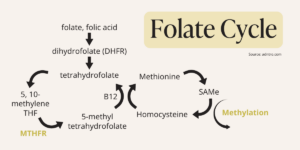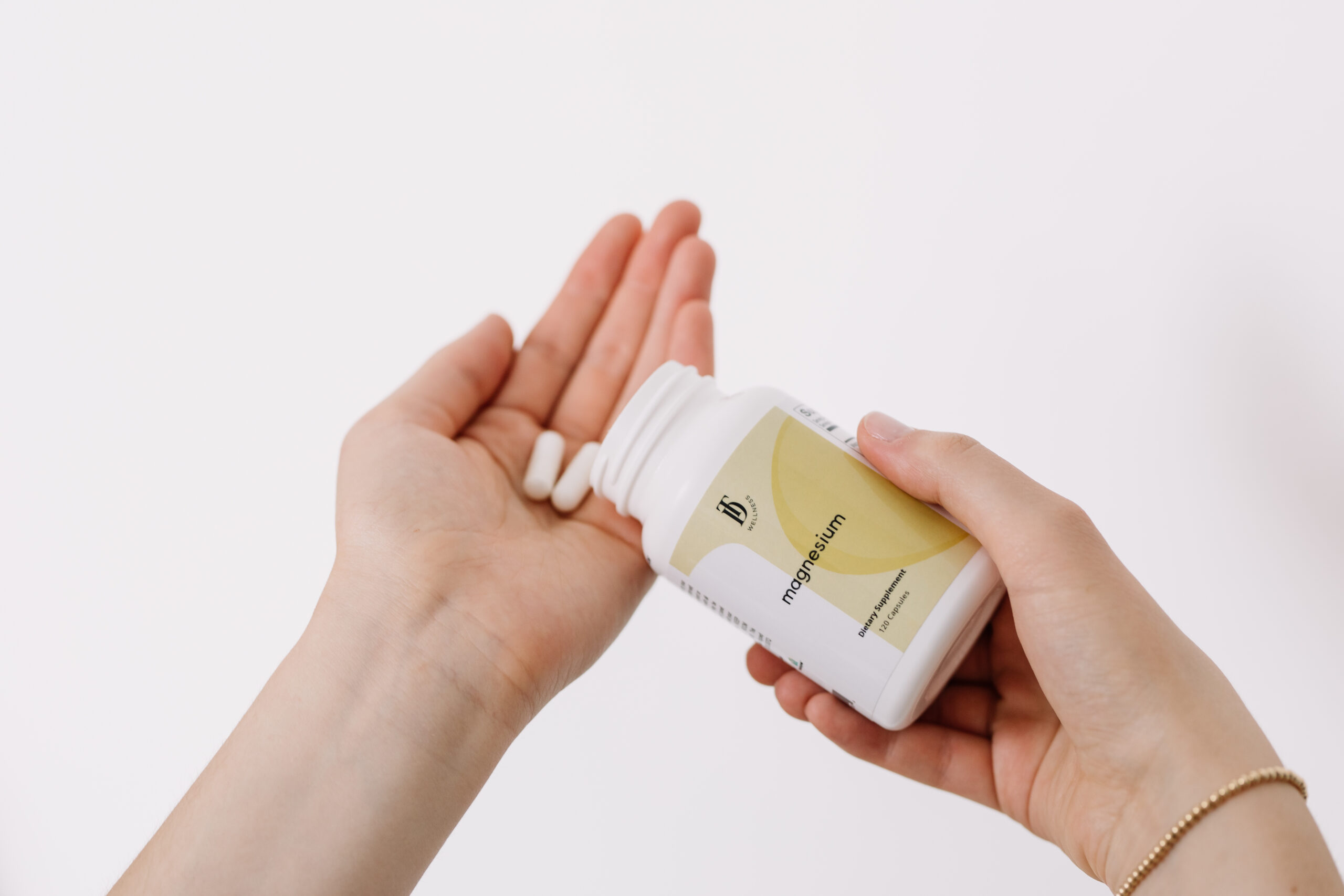What You Need to Know About Methylation & the MTHFR Gene Mutation

Have you heard of methylation or even the MTHFR gene mutation? Your conventional doctor likely won’t bring this topic up to you, but it could be an important puzzle piece to your health.
Methylation controls so many vital functions in the body from detoxing to brain function, heart health, gut health, hormone balance, and more. It can even alter the way our genes are expressed.
Despite this, most of us don’t know if our own methylation processes are even working efficiently, or even how to improve our methylation to enjoy more robust health across the entire body.
Let’s dive into how you can change this. I’ll walk you through all things methylation, including how to know if your body is having issues with this important process and how you can support it.
What Is Methylation?
While “methylation” is currently a buzzword, that doesn’t mean it’s one to ignore when it comes to your health. Methylation is a biochemical process that occurs billions of times per day inside your body. It is critical for so many of the processes that contribute to proper functioning of your cells and organs.
In simple terms, methylation acts like a switch that can turn genes “on” and “off” and is involved in DNA repair. Think of it as a green or red traffic light inside your body. This is important because changes in methylation patterns can influence gene expression and protein function can affect our health, increasing our risk of developing certain diseases, including cancer.
In more scientific terms, methylation refers to chemical processes in the body where a small molecule (called a methyl group) gets added to DNA, proteins, or other molecules. The addition of methyl groups can affect how DNA, proteins, and other molecules act.
When our body is methylating optimally, it has a significantly positive effect on the body’s well-being. Here is a look at some of the roles methylation plays inside our body:
- Helping the body detox, especially the liver
- Improving our response to inflammation
- Strengthening our immune system
- Clearing out excess estrogen and histamine
- Regulating how our DNA and genes are expressed
- Producing energy for cells to use in chemical reactions
- Breaking down important nutrients into vitamins, minerals, and antioxidants to fuel our body
What Causes Poor Methylation?
Research suggests a significant number of the human population suffers from poor methylation. Everyday stressors, toxins, a lack of key nutrients, and genetic mutations can all interfere with methylation.
Genetic Mutations
Up to 40% of the population may have a MTHFR genetic mutation of some kind, making it challenging for their bodies to properly methylate. We are bio-individuals, so genetic mutations affect everyone differently. Symptoms vary widely among individuals from hardly noticeable to chronic health issues depending on the level of mutation as well as diet and lifestyle factors.
One of the most commonly known variants is the MTHFR gene mutation. MTHFR is a gene that tells the body how to produce an enzyme, methylenetetrahydrofolate reductase, critical to methylation. This enzyme converts folic acid from diets and supplements into its active form, 5-MTHF (also known as active folate vitamin B9 or methylfolate). A MTHFR genetic mutation means the body struggles to convert folic acid to 5-MTHF. And if there is not enough 5-MTHF present, the methylation cycle doesn’t work well and can lead to a buildup of homocysteine in the blood among other issues.

This is why if you have a MTHFR gene mutation, it’s wise to avoid consuming synthetic folic acid from diet or supplements as the body has a harder time converting it to the active form, 5-MTHF, for use in the methylation cycle. Instead, opt for natural folate from food as the body can more easily convert and use it for methylation.
Essential Nutrients
If you aren’t consuming enough of the nutrients necessary to power methylation, you can experience issues with this process without the presence of a genetic mutation. In addition to folate, other important vitamins for proper methylation include: riboflavin (vitamin B2), cobalamin (vitamin B12), pyridoxine (vitamin B6) and choline (vitamin B4), as well as methionine and betaine.
When methylation does not happen efficiently, the following important molecules are not optimally produced within the body:
- Glutathione – often referred to as our “master antioxidant” that fights free radicals
- Coenzyme Q10 – involved in energy production and healthy aging
- Melatonin – helps with sleep
- Serotonin – helps regulate mood, appetite, and more
- Nitric Oxide – helps relax blood vessels to improve blood flow and oxygen supply to tissues
- Norepinephrine – is a neurotransmitter and hormone that gives the body energy to take action during a fight-or-flight response. It also helps maintain sleep-wake cycles
- Epinephrine – aka adrenaline that regulates many bodily functions, including blood pressure and heart rate
- L-Carnitine – an amino acid that helps turn body fat into energy
- Cysteine – an amino acid that helps form collagen in the body
- Taurine – an amino acid that supports the brain, heart, and nerves
How Do I Know If I Have Methylation Problems?
Undermethylation can be difficult to pinpoint because its symptoms are so varied and vast. It plays out differently according to each person’s genetic predispositions and lifestyle choices.
While it can look different on an individual basis, here is a non-comprehensive list of common symptoms that someone can experience with poor methylation:
- Chronic fatigue, low energy levels, or brain fog
- Inflammation
- Digestive issues like bloating, food sensitivities, leaky gut, inflammatory bowel disease, bacterial overgrowth
- Migraines and headaches
- Insomnia or trouble sleeping
- Skin issues like eczema
- Chronic allergies
- Higher risk of certain diseases, including autoimmune disorders (thyroid, arthritis, etc.), diabetes, cancer, Alzheimer’s, and more
- Infertility and hormonal imbalances (polycystic ovarian syndrome (PCOS), PMS, endometriosis, etc.)
- Mood and mental health disorders like ADHD, depression, and anxiety
- Cognitive decline, dementia, and Alzheimer’s disease
- Neurodevelopmental problems such as autism and obsessive compulsive disorder
Labs + Testing
You also have the ability to uncover information about your body’s ability to methylate through lab testing.
Methylation Panel
A methylation panel gathers information regarding your biochemical methylation pathways. It measures methylation metabolites in the blood, and it can be helpful in determining the health of your methylation because it measures your homocysteine levels. Normally, your body quickly breaks down homocysteine. If someone has a mutation in the MTHFR gene, their ability to convert folate effectively can be impaired, leading to elevated levels of homocysteine.
Our TDW Blood Panel via Vibrant Wellness (offered within the TDW Community) includes homocysteine testing.
MTHFR Genetic Testing
As mentioned earlier, a large percentage of the population has a genetic mutation of the MTHFR gene, which is the gene that tells the body to make the MTHFR enzyme. MTHFR enzyme is necessary for the conversion of folate within the body, which is then necessary for making DNA and modifying other proteins. It is also possible to undergo lab work that tells you whether or not you have this MTHFR mutation. If you do, it’s likely that your methylation processes could use support. We recommend Nutrition Genome for this testing, but you can also do standalone MTHFR testing via Quest Diagnostics or LabCorp. Your provider just needs to order it.
How Do I Support Methylation?
It is possible to support the methylation cycle and dramatically improve health across the body in both adults and children. Thankfully, there are many simple ways to do this. Here are my top 4 attainable ways to support your body’s methylation no matter if you have known issues or not:
- Detox, detox, detox. This is a two part process.
First, remove unnecessary toxins from your environment. If your body is coming into contact with less toxins, it naturally follows that it will have less to detox from! Simple ways to do this include the following. I’ve also rounded up all my trusted non-toxic products in this free guide.
- Rid your home of any pesticides, herbicides, weed killers, insect killers, etc. and choose non-toxic alternatives. My husband recently switched to Sunday lawncare and he loves it!
- Remove all products with “fragrance” or “parfum” on the label, including scented candles, plug-ins and air fresheners.
- Switch to a non-toxic house cleaner (Branch Basics is my favorite cleaner for everything from laundry to windows to bathrooms! Use code TAYLORDUKESWELLNESS for first-time customer discount).
- Swap out your conventional personal care products for non-toxic alternatives. I love Primally Pure (use code TAYLORDUKES), Clearstem (use code TAYLORDUKES), OSEA (use code TAYLORDUKES10), and Aleavia (use code TAYLORDUKES) to name a few!
- Remove foods with food colorings, dyes, chemicals, additives, and preservatives. Eat whole, unprocessed foods as much as possible.
Second, support your body’s natural internal detoxification efforts. There are countless ways to do this, but I’m going to share a few that I do:
- Sweat regularly. If you aren’t sweating, you need to open your detox pathways.
- Hydrate properly (with electrolytes, whenever possible).
- Take detox baths.
- Utilize detox therapies like dry brushing and coffee enemas.
- Take Liver Support (the liver is your body’s master detox organ!).
- Get plenty of sunshine, fresh air, and morement (daily, if at all possible).
- Support your nervous system and manage your stress.
While it may not feel obvious, supporting your nervous system is an important piece in supporting proper methylation. When your body is stressed, it does not prioritize detoxification and recovery. All of the body’s processes slow down or suffer when you’re not able to enter the parasympathetic, or rest and digest, state of being.
For an in-depth look on how to support methylation through nervous system regulation and positive stress management, check out my article How to Naturally Support Your Nervous System.
- Supplement efficiently with TDW Methyl Aid.
If you have methylation issues, you’ll want to make sure you’re taking readily available nutrients to make this essential wellness process possible and easier. This is why you’ll want to consider taking TDW Methyl Aid.
This supplement contains activated, methylated B vitamins, so the body can rapidly use them to fuel methylation. It also has trimethylglycine, an important methyl donor. (Note, TDW B Complex also contains the activated form of B vitamins, but not trimethylglycine, meaning it is not as targeted toward methylation as TDW Methyl Aid.)
Methyl Aid is beneficial for anyone looking to improve methylation processes, and an especially important supplement for those who have a genetic mutation like MTHFR.
- Eat a healthy, whole-food, non-processed diet.
Increase your intake of healthy fats (ghee, olive oil, avocados, coconut oil, nuts and seeds, etc.) and cruciferous veggies (Brussels sprouts, broccoli, cabbage, cauliflower, etc.). These are all foods that provide natural folate and B vitamins, which play a critical role in fueling optimal methylation.
I’d avoid inflammatory foods like processed sugar, gluten, conventional dairy, preservatives, chemicals, seed oils, and enriched grains.
- Quit smoking, limit alcohol consumption and caffeine.
Your liver is believed to be the hardest working organ, especially when it comes to detoxing. Smoking, alcohol, and caffeine can all negatively impact the liver’s ability to do its job, which disrupts the methylation cycle. I’d encourage you to avoid smoking and alcohol. Limit caffeine to 1-2 cups per day, and stop caffeine intake by noon.
Improper methylation, or undermethylation, influences so many systems in our bodies that it can be difficult to identify.
It often gets overlooked, although its impact on the body is significant. Begin supporting your body’s methylation processes today and experience improved health across a wide range of areas!
Share This Post:
Your Wellness Deep Dive
- Be the first to learn about new healthy living resources, blog posts, and exclusive TDW offerings by getting on my insider list.
- Find healthy living products with ingredients you can trust – the same ones I personally use for myself and my family – in the TDW Shop. Check out our protein powders, electrolytes, supplements, and more!
- Get personalized support through the TDW Community. When you become a member, you get access to functional medicine expertise from me and my team, functional medicine lab testing and 1:1 consults, a digital library of exclusive wellness content, live monthly Q&As with me, and so much more!
YOU MAY ALSO LIKE:
Helping you get your gut right, improve energy, boost immunity, balance hormones, sleep better and look + feel your best
DISCLAIMER
PRIVACY POLICY
TERMS + CONDITIONS
ACCESSIBILITY
© 2025 Taylor Dukes Wellness
LEARN
SHOP
ABOUT
TDW Community
Free Guides
Blog
TDW Store
Fullscript
About Taylor
Press
Contact
COOKIE POLICY
SITE CREDIT
Trusted Products



